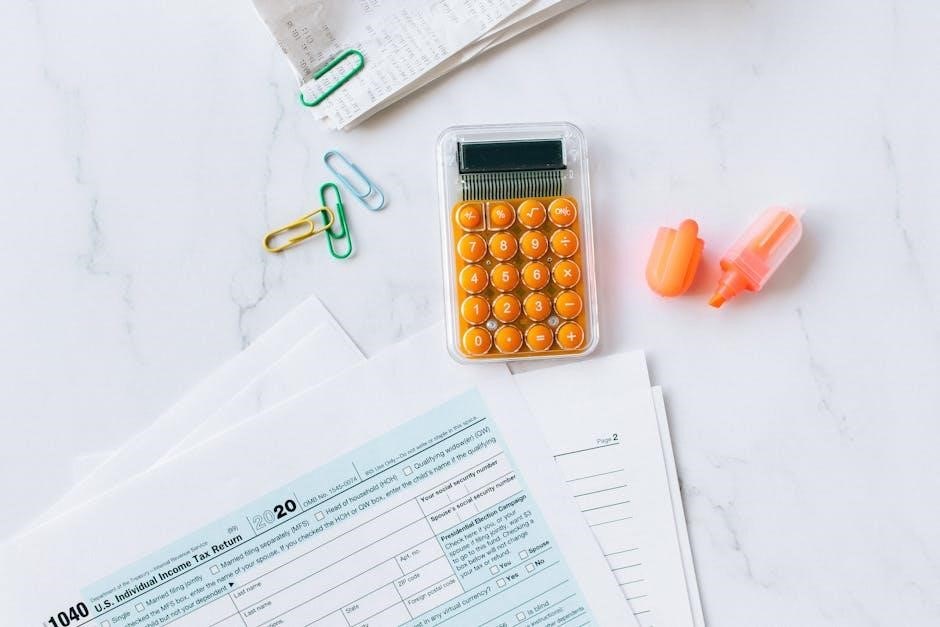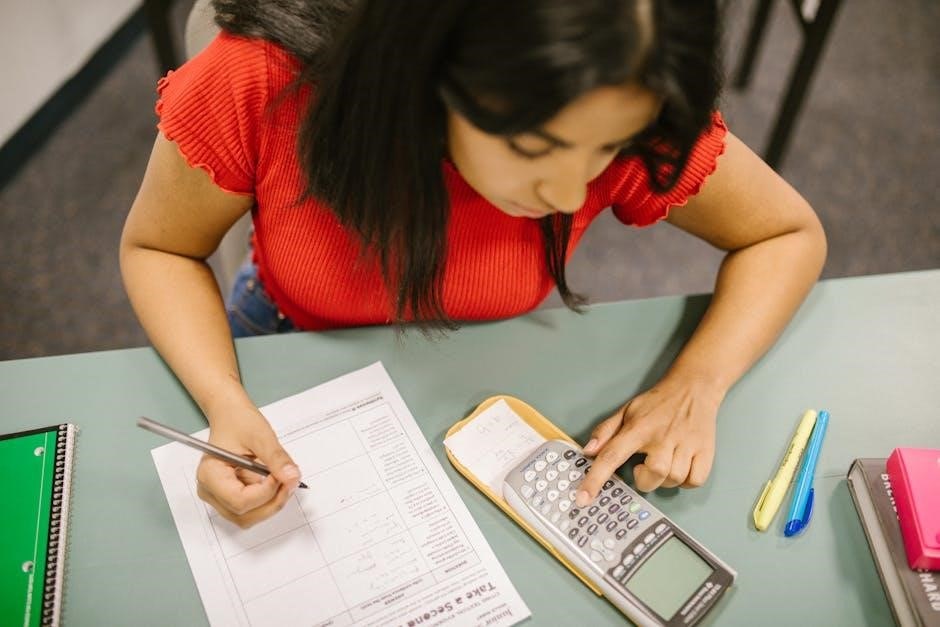Year 3 Maths Test Papers are essential resources for assessing maths understanding. These free printable PDFs cover various topics, helping students build confidence and mastery of key skills.
Importance of Year 3 Maths Test Papers
Year 3 Maths Test Papers are vital for assessing a child’s understanding of mathematical concepts. They help identify learning gaps and track progress over time. Regular practice with these printable PDFs builds problem-solving skills, improves accuracy, and enhances time management. Additionally, they prepare students for standardized tests and reinforce topics like multiplication, division, and arithmetic operations. These resources align with the national curriculum, ensuring comprehensive learning and confidence building in maths.
Key Features of Year 3 Maths Test Papers
Year 3 Maths Test Papers are designed to cover a wide range of topics, including arithmetic, multiplication, and division. They are available as printable PDFs, making them easy to access and use. These papers often include answer sheets for quick assessment and feature timed sections to improve time management. They also focus on problem-solving skills and critical thinking, aligning with the national curriculum; Many resources are free and offer comprehensive coverage of maths concepts, ensuring a well-rounded learning experience for students.

Free Resources for Year 3 Maths Test Papers
Access free Year 3 Maths Test Papers as printable PDFs online. These resources are ideal for practice, covering key topics and aligning with curriculum standards for effective learning.

Popular Websites Offering Free PDFs
Websites like Twinkl, White Rose Maths, and Kung Fu Math provide free Year 3 Maths Test Papers as downloadable PDFs. These platforms offer a wide range of practice questions, assessments, and worksheets tailored to the curriculum. They cover topics such as arithmetic, problem-solving, and critical thinking, ensuring comprehensive preparation for students. Parents and educators can easily access these resources to support learning and track progress effectively. These PDFs are designed to be user-friendly and aligned with educational standards;
How to Download and Use Free Resources
To access Year 3 Maths Test Papers, visit websites like Twinkl or White Rose Maths. Search for “Year 3 Maths Test Papers PDF” and select the desired resource. Download the PDF directly to your device or print it for offline use. These resources are designed to align with the curriculum, ensuring relevance and effectiveness. Use them for practice, assessments, or homework to support learning and track progress. Many resources include answer sheets for easy grading and feedback.
Benefits of Using Free Test Papers
Using free Year 3 Maths Test Papers offers numerous advantages. They provide convenient access to practice materials, helping students reinforce maths skills at home. These resources are curriculum-aligned, ensuring relevance and effectiveness. Parents and teachers can track progress easily, identifying areas for improvement. Additionally, free PDFs save costs and time, allowing for flexible learning. They also build confidence and reduce exam anxiety by familiarizing students with test formats and question types, making them a valuable tool for academic success.

Paid Resources for Year 3 Maths Test Papers
Paid resources offer comprehensive and structured Year 3 Maths Test Papers. They provide detailed answers and interactive tools, ensuring a thorough understanding of maths concepts and exam preparation.
Subscription-Based Platforms
Subscription-based platforms like Twinkl and White Rose Maths offer exclusive Year 3 Maths Test Papers. These platforms provide access to premium content, including interactive worksheets and gradable assessments. With a subscription, users can download PDFs tailored to the national curriculum, ensuring comprehensive coverage of maths topics. Regular updates and new resources keep the content fresh and relevant, making these platforms a valuable investment for both teachers and parents seeking high-quality educational material;
Comprehensive Paid Worksheets

Paid worksheets for Year 3 Maths offer detailed practice across various topics. Platforms like Twinkl provide curriculum-aligned resources, including arithmetic tests and problem-solving exercises. These worksheets often feature step-by-step solutions and progress tracking tools, making them ideal for structured learning. With a focus on skills like multiplication, division, and measurement, these paid resources ensure a thorough understanding of maths concepts, supporting both classroom and home learning environments.
Advantages of Paid Resources
Paid resources for Year 3 Maths offer comprehensive coverage of curriculum topics, ensuring in-depth practice. They provide tailored difficulty levels and interactive elements to engage students. Paid worksheets often include progress tracking tools and expert-verified answers, enabling effective learning. These resources are curated by education professionals, ensuring high quality and relevance. They also support differentiated instruction, catering to varied learning needs and styles, making them a valuable investment for consistent academic improvement. Paid resources are ideal for both classroom and home learning environments.

Effective Preparation Strategies
Effective preparation involves creating a structured study plan and practicing regularly with maths test papers. This ensures consistent improvement and mastery of key concepts.
Creating a Study Plan

A well-structured study plan is crucial for effective preparation. Begin by setting clear goals and identifying areas needing improvement. Organize your resources, such as Year 3 maths test papers, into topics. Allocate specific times for practice and review. Use a calendar to track progress and ensure consistency. Incorporate breaks to maintain focus and avoid burnout. Regularly assess your performance using free PDFs and adjust your plan as needed. This structured approach will help build confidence and mastery of maths concepts.
Time Management Techniques
Effective time management is key to mastering maths. Allocate specific durations for each section of the test paper. Use timers to simulate exam conditions. Prioritize questions based on difficulty to maximize scores. Regular breaks help maintain focus. Utilize Year 3 maths test papers to practice under timed conditions, enhancing speed and accuracy. These techniques ensure students complete tests confidently within the allotted time, improving overall performance and reducing stress during assessments.
Reviewing and Learning from Mistakes
Reviewing maths test papers helps identify errors and understand gaps in knowledge. Compare answers with provided solutions to pinpoint mistakes. Use step-by-step explanations to grasp concepts better. Reflect on common errors to avoid repeating them. Regular review fosters a deeper understanding of maths principles, improving problem-solving skills and confidence. This process ensures continuous learning and better performance in subsequent assessments, making it an essential part of effective maths preparation.

Assessing and Providing Feedback
Year 3 Maths Test Papers include assessment methods and feedback tools, helping identify strengths and weaknesses to guide further learning.
Methods of Assessment
Year 3 Maths Test Papers utilize various assessment methods to evaluate student progress. These include structured tests, problem-solving exercises, and mental maths challenges. Tests are often divided into sections, focusing on areas like arithmetic, geometry, and word problems. Answer sheets and marking schemes are provided for accurate grading. Additionally, progress tracking tools help identify areas needing improvement, ensuring tailored support for each student’s learning journey.
Tools for Effective Feedback
Effective feedback is enhanced through tools like answer sheets and marking schemes, which provide clear expectations and accurate grading. Progress tracking templates help identify areas needing improvement, while student self-assessment checklists encourage reflection. Platforms offering immediate feedback on completed tests also support learning. These tools enable teachers to deliver constructive comments, helping students understand their strengths and weaknesses, and guiding them toward targeted practice and improvement.
Improving Performance Through Feedback
Feedback is a powerful tool for improving performance in Year 3 maths. By reviewing test results, students can identify areas needing attention. Teachers can provide constructive comments, guiding students to focus on specific skills. Targeted practice worksheets and revision guides help reinforce learning. Regular feedback sessions encourage reflection, fostering a growth mindset and helping students achieve their full potential; This iterative process ensures continuous improvement and confidence in maths abilities.

Advanced Topics and Problem Solving
Feedback enhances learning by identifying strengths and weaknesses. Reviewing test results helps students understand their mistakes. Teachers can provide targeted guidance, while practice worksheets reinforce concepts. Regular feedback fosters reflection, improving problem-solving skills and boosting confidence in Year 3 maths. This iterative process ensures steady progress and better understanding of key topics.
Strategies for Solving Complex Problems

Encourage students to break down problems into smaller, manageable steps. Using visual aids like diagrams or number lines can simplify complex concepts. Teaching techniques such as reverse operations or applying known maths facts enhances problem-solving abilities. Guiding students to identify patterns or relationships between numbers helps build confidence. Regular practice with challenging questions from Year 3 maths test papers fosters critical thinking and resilience, preparing them for advanced topics and real-world applications.
Critical Thinking Exercises
Critical thinking exercises in Year 3 maths test papers help students develop analytical skills and logical reasoning. These exercises often involve identifying patterns, solving word problems, and applying maths to real-world scenarios. Students learn to question, analyze, and evaluate information, fostering deeper understanding and creativity. Regular practice with these exercises enhances problem-solving abilities and prepares students for more complex maths challenges. They encourage students to think independently and confidently, ensuring a strong foundation for future learning.
